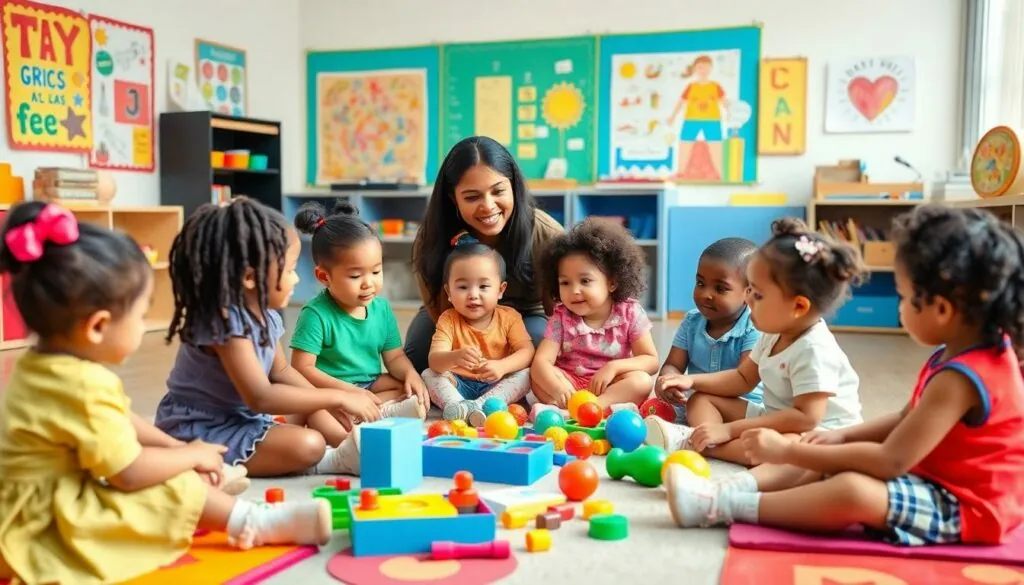Table of Contents
ToggleIn the bustling heart of Chicago, early learning isn’t just a necessity; it’s an adventure waiting to unfold. Picture this: tiny tots embarking on a journey filled with laughter, discovery, and the occasional crayon mishap. Parents often wonder how to give their little ones a head start, and Chicago’s vibrant early learning programs are the ticket to that ride.
Overview of Chicago Early Learning
Chicago early learning initiatives provide a robust foundation for children’s education. Programs offer diverse learning opportunities that cater to the unique needs of young learners. Families find multiple options, including preschool, early Head Start, and community-based organizations.
Research shows that quality early education significantly influences a child’s academic success and social-emotional development. According to the Illinois State Board of Education, early childhood education participants show improved language and literacy skills. Families appreciate the variety of curricula available in these programs, ensuring engaging and stimulating environments for children.
Funding for early learning programs comes from various sources, including government grants and community partnerships. State initiatives focus on increasing access to education for underserved populations. Additionally, Chicago Public Schools actively promote early childhood education, allocating resources to strengthen these programs.
Parents often engage with teachers and staff, fostering collaboration between home and school. Strong connections build trust and enhance children’s learning experiences. Schools integrate family-oriented events that encourage participation in children’s educational journeys.
The impact of early learning extends beyond immediate academic benefits, contributing to long-term success. Statistics from the National Institute for Early Education Research confirm that children with quality pre-K experiences perform better in later grades. These initiatives create a supportive community that values education and promotes lifelong learning.
Importance of Early Childhood Education

Early childhood education plays a vital role in shaping children’s futures. It provides foundational skills that propel academic success and personal development.
Developmental Benefits
Development occurs rapidly during early childhood. Children exposed to high-quality early education programs demonstrate improved cognitive and language skills. They often develop better social-emotional abilities, leading to stronger peer relationships. Engaging learning environments enhance curiosity and motivation, empowering children to explore new concepts. Activities designed for young learners cater to various developmental milestones, ensuring each child thrives. Research consistently shows that early education participants exhibit significantly higher literacy rates than their peers.
Long-term Impact on Communities
Strong early learning programs foster vibrant communities. Communities benefit when children access quality educational resources, as this leads to higher graduation rates. Economic contributions also rise when individuals secure better jobs due to their educational foundations. Additionally, neighborhoods with involved families create supportive ecosystems that prioritize education. According to the National Institute for Early Education Research, these programs reduce social disparities and promote inclusivity. Communities that invest in early childhood education often experience lower crime rates, further enhancing overall social well-being.
Chicago Early Learning Programs
Chicago’s early learning programs provide diverse opportunities that enrich children’s educational foundations. Families can access various options tailored to young learners’ needs.
Types of Programs Offered
Numerous early learning programs exist in Chicago. Preschool programs focus on fostering social skills and early literacy. Early Head Start targets infants and toddlers, emphasizing developmental support. Community-based organizations often enhance these offerings through supplementary services. Quality programs create engaging environments that stimulate curiosity and motivation. Research consistently shows that such programs significantly impact cognitive development and academic readiness.
Enrollment Process and Eligibility
Enrollment processes vary by program. Families typically need to complete applications, often available online or through local offices. Eligibility criteria depend on several factors, including age, income, and neighborhood. Many programs prioritize underserved populations to ensure equitable access. Documentation of income, residency, and child’s age may be required. Engaging in these programs provides families with vital resources, contributing to their children’s educational success.
Challenges Facing Chicago Early Learning
Chicago’s early learning initiatives encounter several challenges that impact program effectiveness and accessibility.
Funding and Resources
Funding for early learning programs often fluctuates. Budget constraints limit the availability of essential resources. These financial limitations can restrict program expansion, impacting enrollment numbers in quality education options. Public funding primarily comes from state and federal grants, though many local organizations contribute through partnerships. Resource allocation often prioritizes areas with higher needs, yet these investments may still fall short. Schools and community organizations strive to maximize the funds they receive, yet community demand still often exceeds available financial support. Continuous advocacy for increased funding remains crucial to improving early learning opportunities in Chicago.
Access and Equity Issues
Access to early learning programs often varies based on neighborhood and socioeconomic status. Families in underserved communities face significant barriers, including transportation difficulties and limited program availability. Language barriers also complicate enrollment processes for immigrant families. Despite efforts to promote inclusivity, many eligible children do not participate in early education programs. Research highlights that children in low-income areas see fewer options, which exacerbates educational inequalities. Furthermore, outreach initiatives targeting marginalized groups frequently require additional resources and support. As a result, achieving equitable access to early learning opportunities is vital for fostering a more inclusive educational landscape in Chicago.
Success Stories and Outcomes
Chicago’s early learning programs produce impressive outcomes for children. Studies indicate that children who participate in quality early education programs consistently outperform their peers in elementary school. Research shows that these students exhibit enhanced language and literacy skills, fostering future academic success.
Community-based organizations also play a crucial role in shaping positive outcomes. Families enrolled in Early Head Start, for instance, gain access to developmental resources that support infants and toddlers. These comprehensive services promote healthy growth and strong social-emotional development.
Significant funding from government grants bolsters the effectiveness of these initiatives. The city’s partnership with organizations enhances resources for underprivileged families, expanding access to essential educational opportunities. Such collaborations address barriers faced by low-income households, ensuring every child can thrive.
Parental involvement elevates the success rates of early learning programs. Active participation creates stronger connections between families and educators, enhancing children’s overall learning experiences. Engaged parents tend to reinforce educational activities in the home, contributing to better outcomes.
Graduation rates in neighborhoods with strong early learning programs tend to be higher. Individuals from these communities often secure better job opportunities, contributing to local economic growth. Programs that focus on inclusivity and community-building foster an environment that nurtures all children.
Challenges remain, including fluctuations in funding that can limit program reach. Not every family accesses these enriching experiences, particularly in underserved areas. By advocating for continued support and resources, stakeholders aim to bridge gaps in educational equity.
Overall, early learning initiatives in Chicago demonstrate a strong impact, benefitting children and families alike. Those who invest in quality early education contribute to a brighter future for the entire community.
Chicago’s early learning programs are vital in shaping the future of its children. By providing diverse educational opportunities and fostering strong family engagement, these initiatives create a supportive environment for young learners. The positive impacts of quality early education extend beyond academics, nurturing social-emotional skills and building vibrant communities.
Despite challenges like funding fluctuations and accessibility issues, the commitment to improving early learning remains strong. Advocating for equitable access ensures that every child in Chicago can benefit from these essential resources. As families and educators continue to collaborate, the foundation for lifelong success is strengthened, paving the way for a brighter future for all.







